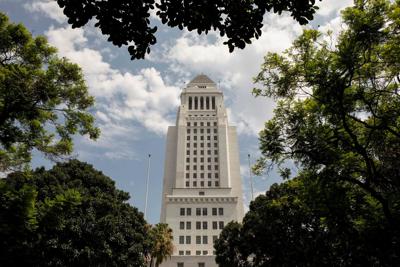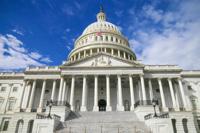It’s hard to notice, but this is a season of political reform in Los Angeles.
In a month, voters here will consider not one but three government reform measures: One would create a redistricting commission for the city of Los Angeles; one would impose new rules on financial disclosure by city commissioners; and a third would expand the county Board of Supervisors and create a countywide elected leader, akin to a county mayor.
Meanwhile, the city is embarking on a broader charter reform effort that could result in a significantly expanded Los Angeles City Council, an idea that has kicked around city politics at least since the 1990s, when voters rejected it.
If all these measures made their way into law, local government in the nation’s second-largest city — and its largest county — could look very different a few years from now.
Council members and supervisors might have smaller districts and stricter penalties for violating campaign finance rules enforced by empowered — but still fairly toothless — ethics commissions. At the city level, a new redistricting commission could insulate the crucial work of drawing district lines from the politicians who stand most to gain by that process. And the county, which has spent the better part of a century laboring outside of much scrutiny, would, for the first time, have an elected, presumably accountable, person in charge.
So how come Los Angeles is not abuzz at the prospect of change?
County Supervisor Janice Hahn, a second-generation veteran of this city and county’s politics (her dad, Kenneth Hahn, was an icon of both; her brother, James Hahn, was the mayor and she herself has served on both the council and board of supervisors), hints at the reason in her statement supporting the county reform package.
“When asked,” she said, “residents overwhelmingly say they support reforming LA County government. They tell us they want smaller, more representative districts, checks and balances, and commonsense ethics reforms that hold officials accountable.”
Note the “when asked.”
In fact, neither city nor county residents evidence much of the anger that generally accompanies a push for reform.
Take, for example, the package of reforms that resulted in the overhaul of the Los Angeles Police Department in the 1990s. Those measures, the most important of which created a term of office for the city’s chief of police, passed after LAPD officers beat Rodney King into submission and after the city exploded in riots when those officers were acquitted of using excessive force (two were convicted of violating his civil rights, but that came later).
The beating and the riots created a broad consensus that something dramatic needed to change in the oversight of the city’s police force. There was palpable voter anger, and it was skillfully channeled into reform.
This time, the reform measures making their way to the ballot represent the long tail of a controversy that began in 2022, when an audio recording of three LA council members and a union leader surfaced, capturing a crude, racist analysis of city politics and their desire to reshape districts along racial lines.
In political terms, that was a long time ago. Two years later, the redistricting commission comes as a response to the uneasiness created by the tape. In the meantime, many voters have probably forgotten what they were mad about. One of the council members featured on the recordings, Kevin de Leon, is still in office and might get reelected in November.
At the county, meanwhile, the reform measures are untethered to any specific controversy. Instead, those are ideas that reflect the long-simmering sense that Los Angeles County has outgrown its governance structure. Raphe Sonenshein, a leading historian of Los Angeles, made that argument in his analysis of the proposed changes, “L.A. County Reform: A Cow County No More.”
Recent surveys of Los Angeles residents find plenty of sources of unhappiness — with the cost of living, especially rents; with education; with transportation — but that polling has not uncovered deep unhappiness with government itself. Mayor Karen Bass, for instance, has maintained a healthy approval rating.
The question for proponents of these reforms, then, is whether voters will be concerned enough about structural issues of government — the size of districts, who draws council boundaries, the accountability upside for a county mayor — to upend longstanding institutional arrangements in order to try something new.
So far, in private polling I reviewed, there seems to be voter support. More than two-thirds of likely voters in one survey early in the summer said they supported the county reform package. Another survey of Latinos, this one made public, showed support there as well, with 53% saying they favored the reforms and only 7% opposing it, though half of those polled said neither party had reached out to them to encourage them to participate.
Supporters are optimistic about their chances for the various reform measures. Independent redistricting is a popular idea, and no real opposition has surfaced to the idea of expanding the Board of Supervisors. But neither idea is an easy sell, and it’s a guiding principle of California politics that support for reforms tends to fade as Election Day approaches.
That’s where one last issue may become relevant.
The relative media disinterest in these proposals is understandable. So much attention is focused on the presidential campaign that it’s difficult to expend resources on ballot measures to reform local government. But the declining quantity and quality of local news coverage in Los Angeles may show up here.
Measures like these require explanation to overcome voter resistance. A voter who believes county government needs improvement, for instance, might understandably wonder why doubling the number of county supervisors would make things better, not worse. And for the voter who is concerned about high rents in Los Angeles, it’s fair to wonder how a redistricting commission will make that better.
Without clearer answers coming from local media and voters focusing their attention elsewhere, Angelenos will be left to research those questions themselves or work harder to get that information. That’s asking a lot of busy people.
Whether it’s too much is what the votes on these questions will test.









(0) comments
Welcome to the discussion.
Log In
Keep it Clean. Please avoid obscene, vulgar, lewd, racist or sexually-oriented language.
PLEASE TURN OFF YOUR CAPS LOCK.
Don't Threaten. Threats of harming another person will not be tolerated.
Be Truthful. Don't knowingly lie about anyone or anything.
Be Nice. No racism, sexism or any sort of -ism that is degrading to another person.
Be Proactive. Use the 'Report' link on each comment to let us know of abusive posts.
Share with Us. We'd love to hear eyewitness accounts, the history behind an article.